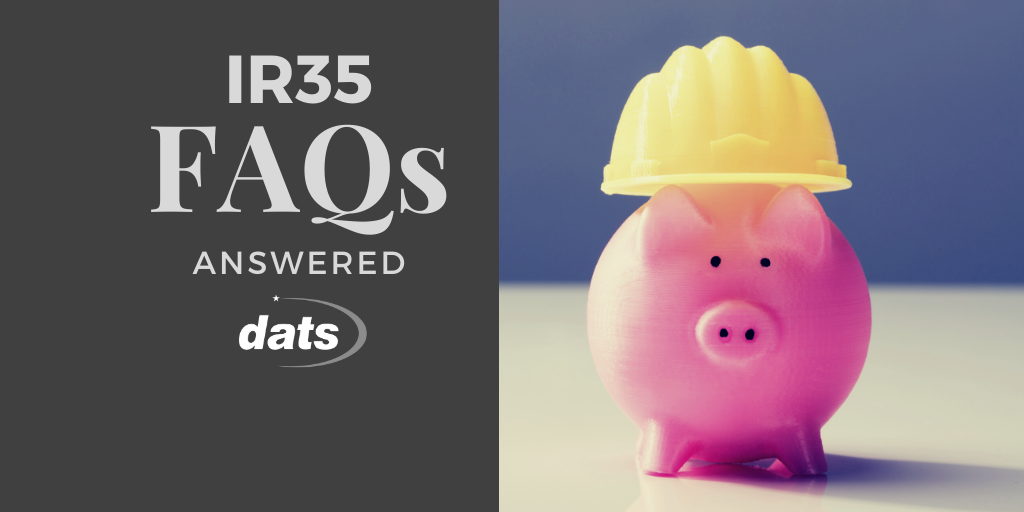
With changes in IR35 legislation due to come into effect next April, a range of questions are understandably being posed. Both clients and contractors are eager to know how IR35 will directly impact them. Below, we’ve included some of the most frequently asked questions, along with our answers.
What is IR35?
IR35 is a tax law. It first came into force across the UK in April 2000 to prevent contractors working as disguised employees and avoiding tax.
When does it come into effect and when do I need to act?
The changes officially come into play on 6th April 2020 but the time to start planning is now. Experts claim that it’s a risk for contractors and companies to wait until the new year to put plans in place.
What do the changes involve?
The most prominent change in legislation is that despite responsibility having previously sat with the contractor, it’s now up to clients to determine whether an individual sits inside or outside of IR35.
Will the changes affect me?
If you’re a contractor or someone who engages contractors, then an assessment will need to be made as to whether IR35 applies or not. If you are, or engage, a genuine contractor, freelancer, interim worker or consultant then you shouldn’t need to worry. If there are any grey areas and you could be construed as NOT being or engaging a genuine contractor, then absolutely, the changes will affect you and cannot be ignored.
What are the implications of not complying with IR35?
Penalties will be enforced by the government (HMRC) as the result of non-compliance. “Disguised employees” could lead to hefty fines for both employers and contractors. Ultimately, HMRC will be looking to recover unpaid income tax and National Insurance Contributions, along with penalties (of up to 100% of the unpaid tax and NICs) and interest.
I’m a contractor – what should I do?
Although responsibility for determining whether you are inside or outside of IR35 no longer sits with you where you are engaged with a public sector body, or a large/medium sized company, you may wish to ensure that the company you contract with is taking the necessary steps to prepare. Liability travels down a chain and although you may no longer sit at the top of it, should things go wrong you can still be subject to investigations and fines.
You should also review your contract to ensure that its clear that you are not employed by your client.
I’m an employer – what are the first steps I need to take?
The first stage, which we advise should be done imminently if the process has not already been started, is to review and audit your current workforce. Look at every individual and determine whether they could be affected by IR35.
The next step is to identify which workers fall inside and outside of IR35, before reviewing and amending any contracts to ensure they are in line with the requirements of IR35 and building a strategy for ensuring compliance with the IR35 legislation from April 2020 onwards.
Are all companies expected to comply?
Small companies are currently exempt from the changes – that’s a company defined by HMRC as:
- Having an annual turnover of less than £10.2m
- Having a balance sheet of less that £5.1m
- Having less than 50 employees
Contractors engaged with small businesses will continue to be responsible for their own compliance with the IR35 legislation.
How are assessments on whether someone sits inside or outside of IR35 made?
HMRC use a number of factors in determining IR35 status, but the main ones are: control, substitution, mutuality of obligation and financial risk. They may further look at other things like whether equipment is provided to a contractor, whether the contract is expected to work exclusively for the client, hold their own business insurance and operate in business of their own account when assessing IR35 status.
Examples of each are as follows: ‘Control’ would refer to the amount of control and flexibility a contractor has over their working day. ‘Substitution’ is to do with whether a substitute could be found to replace a contractor in their absence. ‘Mutuality of obligation’ questions whether a contractor is able to dictate which jobs they take. Financial risk is whether the contract has to rectify defective work in their own time/cost.
What is DATS doing in relation to the IR35 changes?
DATS is actively working with both our clients and contractors to ensure that the implications of the legislation updates and responsibilities are fully understood. This includes a full schedule of email communications and face to face meetings. We are also pleased to be hosting three IR35 events in November for our contractors, clients and candidates which are free to attend and will clear up any pressing questions you may have.
We’re keeping abreast of the legislation changes ourselves by partnering with Brookson and have recently attended seminars with EY and TEAM.
Does IR35 mean the end of contracting?
Absolutely not. Whilst some organisations and individuals may find that the best option for them is a shift from contract to permanent roles, contracting will continue to be a viable option for many. It also remains an option to continue to work via a personal service company, even where the engagement falls within the scope of IR35, providing tax is deducted accordingly which is something which DATS will be supporting clients and contractors with.
How can I find out more about what IR35 means for me?
DATS is hosting three events throughout November – one for clients and two for contractors/candidates. Come along to learn more about how the legislation changes will affect you and what you need to do to prepare.
Book your place here: https://datscadservices.com/events-are-you-ir35-ready/
Alternatively, find out more about IR35 here.
Blockquote example
2019 Round-up
As we near the end of what’s been a particularly memorable year for DATS, it’s the perfect time to look back on some of our highlights. It’s been a jam-packed 2019, making the months fly by. Here are some of our best bits…New CAD Services Website January was the...
Design for Manufacturing
One of our most recent features explored 3D printing and the benefits it’s bringing to the ever-changing world of manufacturing. It reduces both time and cost in the production and assembly of parts, refining processes and increasing efficiency. But even before we get...
Our 60th Birthday Bash
We couldn't let our 60th year pass without a celebration! Employees past and present met with clients and contractors at The Treasury private dining room to raise a glass to six decades of DATS.October marks DATS' official anniversary and Thursday 10th October was the...




